Where Prostitution Is Legal In France
 |
| Where Prostitution Is Legal In France |
| Table Content |
Prostitution in France was legal until April 2016, but several surrounding activities were illegal, like operating a brothel, living off the avails (pimping), and paying for sex with someone under the age of 18 (the age of consent for sex is 15).
On 6 April 2016, the French National Assembly voted to punish customers of prostitutes by a fine of €1,500.
In the Napoleonic era, France became the model for the regulatory approach to prostitution. In the 20th century, however, a policy shift became apparent. Brothels became illegal in 1946, and France signed the Convention for the Suppression of the Traffic in Persons and of the Exploitation of the Prostitution of Others in 1960. France thus became a major supporter of the international abolitionist movement for the eradication of prostitution.
Is prostitution legal in France?
It is legal for a man or woman to be a prostitute and sell sexual acts. The buying of sexual acts was outlawed in April 2016.
Prostitutes pay taxes as other independent activities.
Owning or operating a brothel is illegal.
All forms of proxénétisme (procuring) are illegal. Proxénétisme is defined as:
- "helping" someone to prostitute themselves
- profiting from the prostitution of another person, or receiving funds from someone who prostitutes themselves habitually (living off the avails)
- hiring or training someone to prostitute themselves, or pressuring someone to prostitute themselves.
Prostitution Policies in France
 |
| Photo: ScienceNordic |
France is an "abolitionist" country - its public policy is the prohibition and eradication of prostitution; however, at the same time, it considers that making it illegal to offer sexual acts in return for goods or services in the context of one's private life is a violation of individual liberty.
The issue has been prominent on the French political agenda since the late 1990s, responding to international pressures on child prostitution and pornography and trafficking, international distinctions between forced and voluntary entry into prostitution (rejected by the dominant "abolitionist" discourse) and increasing migration. This has been accompanied by increasing discourse on la sécurité internally, which has gradually become dominant, affecting the framework in which prostitution is debated. This was heightened in 2002 when Jean-Pierre Raffarin's right-wing government (2002–2005) succeeded the Gauche Plurielle (plural left) coalition of Lionel Jospin (1997–2002). The Jospin construction was that prostitutes were victims and needed to be saved and re-integrated. This was a view shared by state feminists, ministers, delegates, and the powerful abolitionist lobby, and is reflected in the Derycke report as well as the National Commission on Violence Against Women, as well as the debates on modern slavery (esclavage moderne). These consultations in turn enabled agents of the civil society access to the policy process. Very few of these constructed prostitution as a legitimate form of work.
At the municipal level, there was evidence of prostitutes being constructed as public nuisances that needed to be confined, and many mayors of both political groups responded to citizen groups to introduce by-laws restricting prostitutes' activities in early 2002. This was fuelled by an apparent increased visibility. For instance, Françoise de Panafieu (UMP delegate 17th arondissement) campaigned against street prostitution in the summer of 2002. The commitment to abolitionism prevented specific laws aimed at prostitution (which would have been seen as regulation) initially, so they often used traffic and parking by-laws to drive out workers, which ultimately mean that they were moved from well-lit busy areas to much more unsafe areas. As the discourse shifted from abolitionism to security, so did more explicit laws and regulations. This disquiet enabled Nicolas Sarkozy to later mobilize public anxiety about security evident in the elections that year in his Domestic Security bill.
The cultural context is the concept of gender equality as stated in the preamble to the 1946 and 1958 constitution and which had seen an increasing momentum of political gains for women, including the establishment of a women's policy agency in 1974 and a ministry of women's rights in 1981. However, a significant gap still exists in terms of economic and employment opportunities. Meanwhile, immigration policies have become increasingly restrictive, and soliciting can result in the removal of a migrant's work permit.
The 2007 Socialist Party Manifesto calls for holding clients "responsible". The vague language is due to the fact that such measures remain controversial in the Socialist Party. The Manifesto also calls for repealing the ban on "passive solicitation".
In 2010, Chantal Brunel, an MP in Sarkozy's ruling right-wing UMP party, and newly appointed head of the equality office, called for legalizing and regulating maisons closes (brothels), (see Maisons closes, below) akin to the situation in several surrounding countries, claiming that this would make the sex trade safer and transparent. She outlined the strategy in her 2010 book "Pour en finir avec les violences faites aux femmes" (An end to violence against women). This caused considerable discussion. French prostitutes are opposed to this plan to legalize and regulate maisons, arguing that it would limit their options to make their own decisions—dozens of French prostitutes have marched to protest the proposal to legalize brothels. Instead, they demand the repeal of the 2003 law outlawing solication, a demand that Chantal Brunel also supports.
In June 2012, the socialist women's minister Najat Vallaud-Belkacem announced that she wanted to abolish prostitution in France and in Europe.
State feminism
State feminists dominated the discourse in the left-wing Jospin years, pursuing an anti-male-violence campaign. As Women's Minister, Nicole Péry, confirmed in her New York speech, prostitution, as a form of male violence, was very much part of that State strategy.
This influence has waned under the security agenda of the succeeding right-wing governments, but is still evident in the new political thinking, as stated in Marie-Jo Zimmermann's (UMP) 2002 report to the Delegation on Women's Rights on prostitution in which she echoes the left wing sentiment that the purchase of sex constitutes violence. The pervasiveness of this thinking is even found in the budget.
Local policy and policy implementation
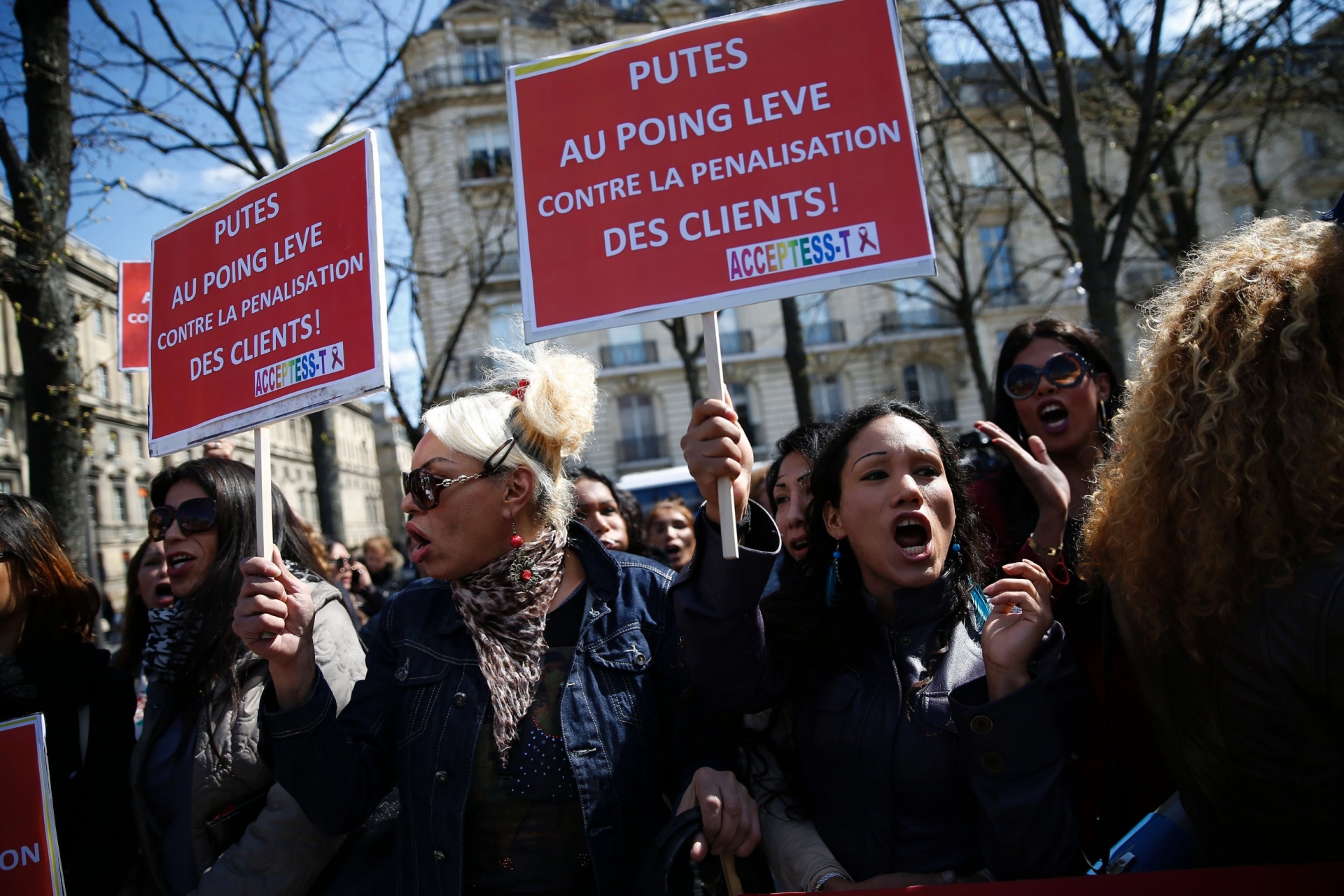 |
| Photo: Newsweek |
The structural tension between a humanitarian and a repressive logic impacts the implementation of law, which very much depends on the local balances between different actors, namely the police, the justice and NGOs. This equilibrium is determined by the Attorney General and the Prefect (who enact a local criminal law policy) as well as by the local power relations between the three groups of actors. While the judicial police (i.e. vice squad) investigate on procuring and human trafficking and the neighbourhood (“public tranquillity”) police act against solicitation, the justice delivers its judgement sentencing pimps and/or prostitutes – confirming or not the results of the police inquiry. In parallel, nongovernmental actors take on protective missions toward sex workers.
Local level policies have to combine allegiance to the political measures adopted on the national level (prostitution being defined as a national prerogative) and preserving public order and tranquillity in public spaces; as a result, there is often a clear difference between law in the books and law in action (Mainsant, 2013). Under the responsibility of a municipal service, called “service of the public tranquillity”, the local forms of municipal action may differ between cities. Some of them have enacted municipal bylaws that are used to displace prostitutes, but also homeless people. Urban public spaces are the subject of particular attention, in order to reassure the residents and discourage sex work activity (through street lighting, tree pruning, police patrols, CCTV cameras…). In most cases, the service of public tranquillity acts in response to requests and complaints from those who live in the vicinity of 12 prostitution areas and organises a series of consultation and dialogue forums with them (Danet & Guienne, 2007; Mathieu, 2013).
Cooperation with NGOs, particularly through the payment of subsidies, plays an important role in the legitimisation of institutional actors responsible for the implementation of prostitution policy but the associations that are recognised and funded by the public authorities can differ from city to city. The full political spectrum and ideological positions is represented among these various NGOs. Some of them, such as the social work Amicale du Nid, refer to abolitionism and offer shelters and rehabilitation programs. At the opposite pole, Cabiria (in Lyon) or Griselidis (in Toulouse), which are AIDS prevention organisations, speak out for sex workers' rights. Between the two positions, Médecins du monde is defending a risk reduction approach. Despite their ideological differences, all associations are engaged into fieldwork: besides providing condoms, legal and health counselling, some associations also accompany sex workers to file a complaint, propose programmes of work retraining, offer protection (and/or a secure accommodation) to endangered victims after they have denounced their traffickers, etc.
Since the passing of the LSI, the enactment of the offence of passive soliciting has exacerbated the tensions between different branches of the law: the sex worker is still defined as a victim of social maladjustment or of trafficking, but s/he is also defined as guilty of soliciting and, as such, as deserving sanction. The wide definition of soliciting in the LSI has first enhanced police discretion over prostitution. As a result, police practices regarding soliciting, while mainly focussing on street prostitution in city centres, were far from uniform over the past decade: research works have shown that they could differ from one city to another, from one neighbourhood to another, or even from one police officer to another (Vernier, 2005). Ethnographic research conducted with police units controlling prostitution (Mainsant, 2012) shows that the indeterminate definition of procuring may also result in competitive 13 logics in the implementation of its repression: a search of prestige for police agents in the field (arresting real “bandits” who exploit many feminine victims because “real bandits make real cops”), hierarchical instructions which relay bureaucratic (to reach a daily rate of arrests) and political imperatives (to erase prostitution from gentrified districts), a legal logic of the justice and a logic of care toward the victim supported by the associations. Among these logics, the prestige logic of street-level police officers seems to prevail over others: the indeterminacy of law is compensated by professional routines, based on police prestige criteria, which determine the investigations led by the police. As a result, it appears that police officers select the cases they think worth of investigation and mainly focus on heterosexual configurations of domination (men procurers exploiting women sex workers), neglecting female procurers or men who exploit male sex workers.
One of the official aims of the LSI was the protection of victims of trafficking: arresting people for soliciting was meant to enable them to denounce their procurers to the police, and illegal migrants who denounce their traffickers could get a temporary residence permit. However this compassionate dimension of the LSI had very few consequences in the implementation of the law, as police officers hardly got complaints against procurers thanks to arrest for soliciting. The repressive dimension rather dominated, according to which police forces focussed on foreign street sex workers suspected of being illegal migrants: according to the official statistics of the police, 85 % of female and 70,5 % of male sex workers having been sentenced for solicitation in 2003 were foreigners.
Sex Worker Organisations
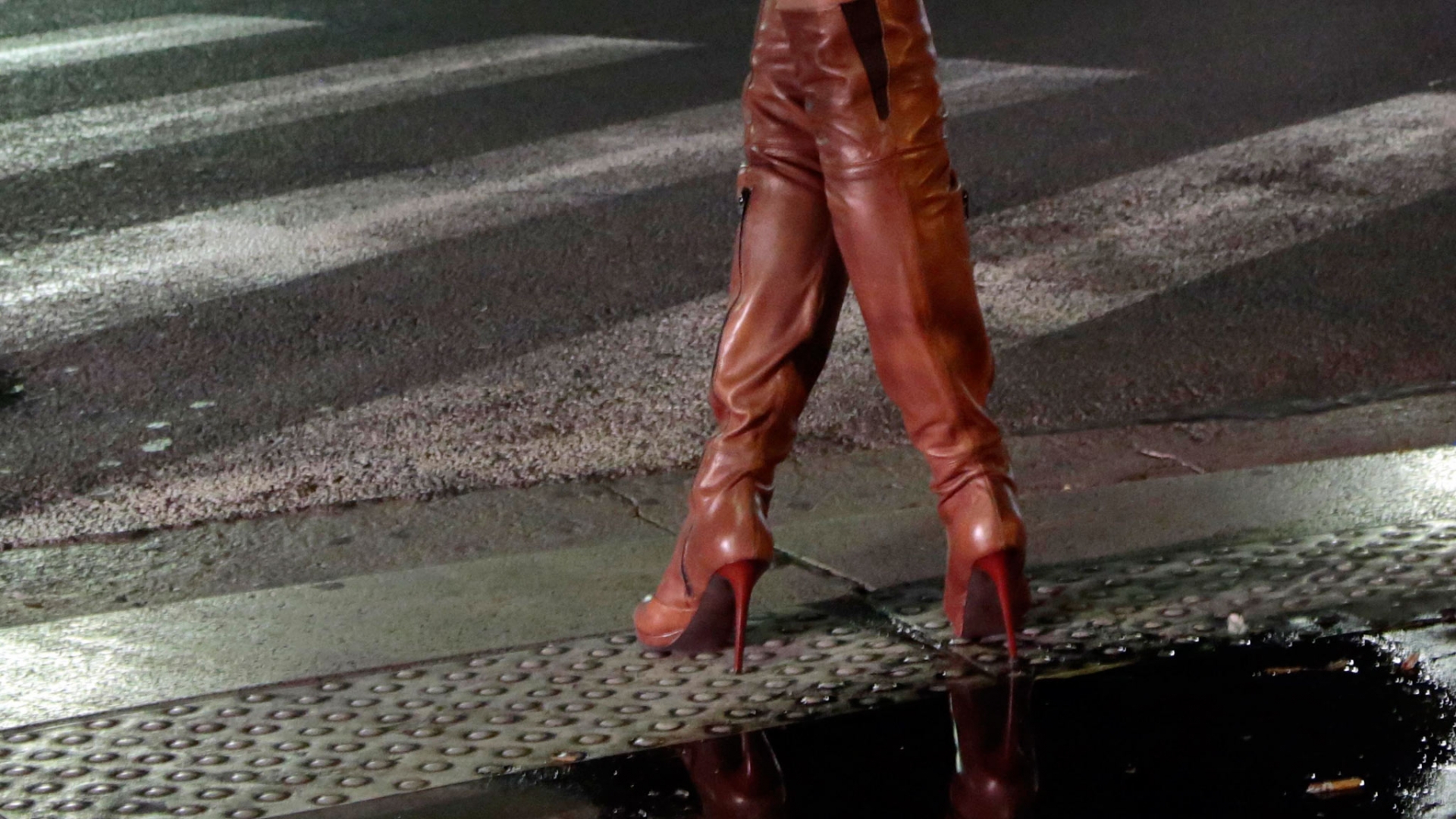 |
| Photo: Financial Times |
Sex workers’ movements have a long history in France. In 1975, women in prostitution occupied churches, first in Lyon then in various towns such as Paris, Marseille and Grenoble, in order to complain against police harassment (Mathieu, 2001). Their mobilisation was supported by feminist and abolitionist groups, and had a tremendous resounding but was only short lived as their main leaders quickly defected. Later attempts to launch sex workers’ organisations (such as the National Association of Prostitutes in 1980) also proved unable to mobilise in the long run. Since then, organisations that support sex workers are cleft between those who frame prostitution as sexist slavery that should be abolished by criminalising clients, and those who consider it a professional occupation that should be officially recognised. The first camp self-identifies as abolitionist and stands as heir of 19th Century crusade against the regulation of prostitution. The Mouvement du Nid (“Movement of the Nest”) is the main and oldest abolitionist group. It was founded in 1946 by a catholic priest, first as a shelter near Paris dedicated to women in prostitution who wanted to leave the trade. Anchored within the progressive factions of the Catholic Church, the Nid quickly expanded in French main towns, where its members still tour prostitution districts to comfort and rescue sex 17 workers; as such the Nid was a pioneer in social work for sex workers.
The Nid also developed as a pressure group aimed at raising awareness about “prostitution realities”, first with its quarterly Prostitution et société but also with public campaigns and conferences in high schools. The Nid has long been reluctant towards coercive means such as the criminalisation of clients, and privileged more educational options in order to end prostitution. It had to suffer a radical flank effect during the 1990s with the development of more intransigent abolitionist groups, like the Fondation Scelles, born of the more conservative Équipes d’action contre le proxénétisme (“Action teams against procuring”), and the adoption of “prostitution as female sexual slavery” frame by the main French feminists groups, such as the Coordination nationale pour les droits des femmes (“National coordination for women’s rights”) and the Mouvement pour l’abolition de la prostitution et de la pornographie (“Movement for the abolition of prostitution and pornography”). Even if sex work is a very controversial issue within the French women’s movement, a majority of feminists define as abolitionists and frame prostitution as sexist violence (Mathieu, 2014). Sex work organisations developed during the late 1990s as counter-movements against the remobilisation of abolitionist groups that, according to them, depicted prostitution in a pejorative way. But 2002, and the project to restore the criminalisation of solicitation, was the most critical moment. Health prevention organisations started to demonstrate, and prostitutes’ spokespersons appeared in the media to complain against what they stigmatised as a criminalisation of prostitution that would endanger prostitutes’ working conditions and security.
Along with feminist support groups (such as Femmes de droit, “Women for Rights”), sex workers’ organisations were launched, like the short-lived France-prostitution. The main group, Les Putes (“The Whores”), was founded in 2006 by former AIDS activists. In 2009, and after a general conference on prostitution, Les Putes became the STRASS, Syndicat du travail sexuel (“Sex Work Union”) that nowadays counts 400 members. The 18 STRASS borrows its contentious frames from the gay and lesbian movement. It defines stigmatisation and discrimination that affect sex workers as putophobia, in reference to homophobia, and organises street demonstrations it calls Putes prides, in imitation of the gay and lesbian prides. Annual Putes prides mark the anniversary of the enactment of the LSI and of the criminalisation of solicitation. The STRASS claims for a complete decriminalisation of prostitution, for a professional status that grants welfare for sex workers, and for a legalisation of self-managed sex houses. It gained institutional recognition in 2011, when it was auditioned by a parliamentary working group on prostitution. However, this political legitimisation was only a formal and symbolic one, as the MPs did not take its claims and statements into consideration, but, as shown above, eventually adopted the opposite abolitionist stances.
How much do French prostitutes earn?
In 2004, the average earnings of a French prostitute were estimated at €500 a day. For Sub-Saharian prostitutes living in France, it was less, around €200–300. Some barely made €50–150 a week.
Prostitution and culture of France
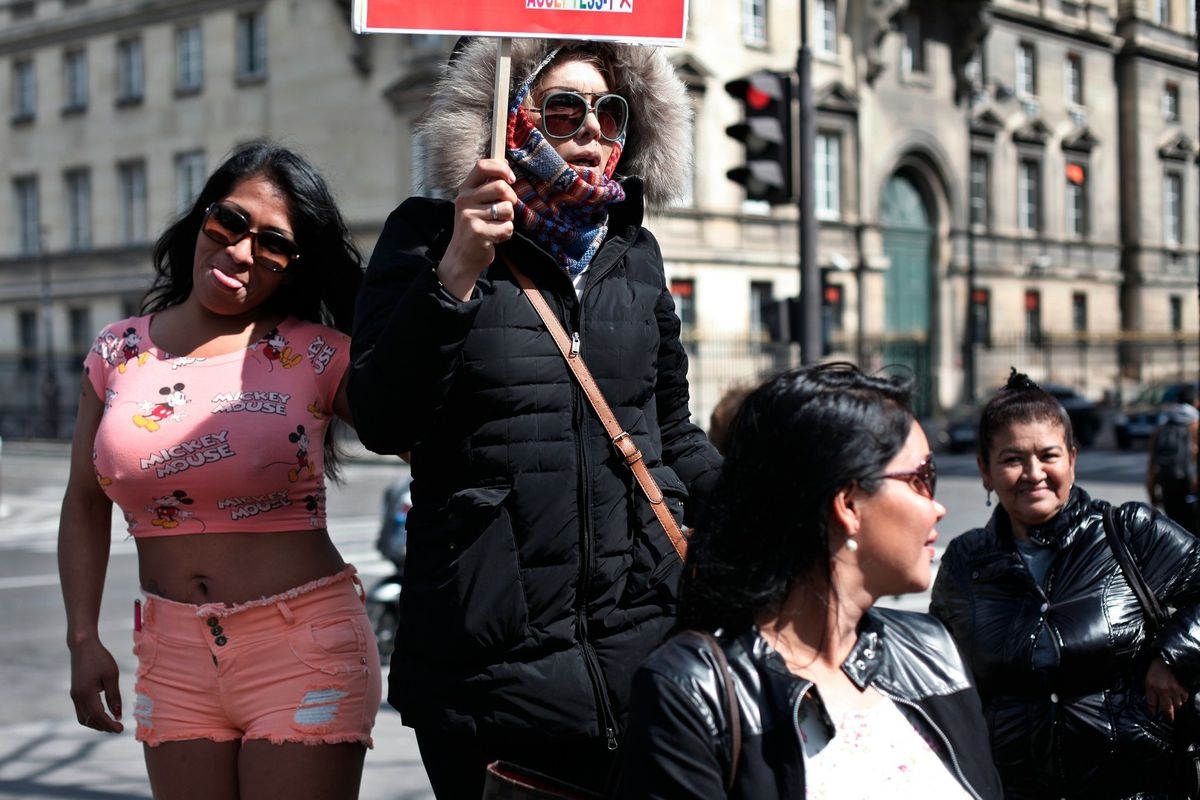 |
| Sex workers hold signs during a protest against new bill against prostitution and sex trafficking, in Paris, Wednesday, April 6, 2016. (AP Photo/Thibault Camus) (The Associated Press) |
Nicolas Sarkozy recognized that the traditional sex worker was part of France's national cultural heritage. Paintings and drawings of maisons closes (brothels), and prostitution appear frequently in art over the centuries, some of which are shown here. Some of the best known are scenes in brothels produced by Henri de Toulouse-Lautrec, Edgar Degas and Pablo Picasso, among others. Brassaï published photographs of brothels in his 1935 book Voluptés de Paris. A voluminous illustrated work on the phenomenon is Maisons closes. L'histoire, l'art, la littérature, les moeurs by Romi (Robert Miquet), first published in 1952.
Amongst writers depicting the life of women in prostitution in France are Honoré de Balzac and Victor Hugo.
The Musée de l'Erotisme in Paris devotes one floor to the maisons closes. It exhibits Polissons et galipettes, a collection of short erotic silent movies that were used to entertain brothel visitors, and copies of Le Guide Rose, a contemporary brothel guide that also carried advertising. The 2003 BBC Four documentary Storyville - Paris Brothel describes the maisons closes.
An exhibition about historical Paris brothels took place from November 2009 to January 2010 in an art gallery across the street from the former Le Chabanais.
 Where Prostitution Is Legal In Nevada Where Prostitution Is Legal In Nevada |
| Studies from 2003 estimated that about 15,000 – 20,000 women work as prostitutes in France. In 2010, the number of full-time male and female prostitutes was estimated at 20,000 – 30,000, with 80% being foreigners. In 2018 it was estimated there were 30,000 prostitutes in the country and 90% were foreign. Sex work in France, like other countries takes many forms. These include street prostitution, escort services, bars, and apartment prostitution. Street prostitution is partly controlled by pimps, while other workers are autonomous prostitutes. In some areas, such as Lyon or the Bois de Boulogne in Paris, sex workers use vans (see illustration). The most famous prostitution street in Paris, the la Rue Saint-Denis, has been somewhat gentrified in recent years and the prostitutes have been moved further north. Escort services where one hires a woman or man for "entertainment" or companionship, but usually including sex, are less common in France, compared to North America. In bars, women try to induce men to buy expensive drinks along with sexual acts. Prices are set by the bar owner, and the money is shared between the owner and the prostitute. Pigalle peepshows are well known for practicing such scams. Prostitution in apartments is advertised in adult newspapers and magazines. Swingers' clubs are places where partner-swapping occurs and sometimes paid prostitutes are in attendance, as well as "amateur" women and couples who get in without paying the flat-rate charge of about 80 to 120 euros that men pay, including food, drink and unlimited sex sessions, with the added twist that these are performed in the open in full view of all the guests. |
Is a ban on buying sex work effective? Sex workers say 'no', according to DWFive years ago, France banned the purchase of sex — but not the sale of it. The prostitition measures aimed to decrease the number of sex workers. The result, however, has seen services pushed into clandestine routes. Sex work. The issue of whether a country should criminalize the industry is a polarizing one — and no less in France. In 2016, lawmakers banned the purchase of sex, but not the sale of it. Today, clients face up to €1,500 ($1,700) in fines for a first-time offense, as well as a €3,750 fine for a repeated offense. Lawmakers at the time hailed the measure as a means to end prostitution and human trafficking while protecting sex workers. Five years on, however, sex workers say they are in more danger than before. Cybele Lesperance, a sex worker and activist based in Chambery, in southeastern France, was one of dozens of protesters across three cities on Tuesday who demonstrated against the bill. The 39-year-old, a Canadian native, said that demand for sex work is lower — but notes that sex workers find themselves in more precarious situations than ever before. Part of this, activists say, is because when the purchase of sex services is banned, those who tend to obey the law avoid seeking these services — and that those who dare to circumvent the law are often delinquents with a criminal history. While the bill aims to empower sex workers, those in the industry say the buyer and provider are not on equal footing. They say the power has shifted to the client, who often demands riskier practices or unusually low rates. "We have people that say, 'Hey, I'm criminalized now and I'm taking the risk — you should make the effort.' Or they say they know that I don't have many clients. And now with COVID the law is worse. There are more threats and verbal violence and more threats to publish your personal data onto the internet," said Lesperance. This is backed by a December 2020 evaluation by researchers at the Sciences Po institute of political studies in Paris, which examined the prostitution act’s "failure" when it comes to power relations between sex workers and clients. More than 10 sex workers were killed in the six months leading up to February 2020, according to a sex workers' rights group. 'Lack of political commitment' to help sex workersFrench Senator Annick Billon, a centrist lawmaker and president of the delegation for women's rights, told DW that around 5,000 fines have been levied against buyers in France since 2016, "which is very little compared to the number of prostitutes estimated at 40,000." Moreover, 564 people have taken part in support programs that help sex workers exit the industry, but only 161 sex workers completed the process. Billon argues that more financial resources need to be dedicated to implementing the current law. "There is a lack of human [police, social workers] and financial resources to support prostitutes for administrative formalities, protect them, enable them to undergo professional training and have the resources to live," she said in a statement to DW. "There’s also a lack of political commitment." "Paradoxically, this law was able to weaken prostitutes. The decline in the number of clients, considered to be delinquents, has forced prostitutes to accept dangerous practices and agree to lower prices," said Billon. "If we had the means to fight against procuring in France as we have the means to fight against drug trafficking, we would make undoubted progress." 'No credible evidence' on link to human traffickingMany activists seeking to end prostitution say the sex services industry should be criminalized in a bid to thwart human trafficking. But studies and anti-human trafficking organizations, like La Strada International, have rejected this stance, saying there is "no credible evidence" to support the theory. La Strada International, however, has said the available evidence suggests such laws place consenting sex workers at higher risk, and that there appears to be a double standard in how industries are regulated. "When it comes to labor exploitation, for example, exploitation of agricultural workers and domestic workers — regardless whether they work here legally or not — people seem to say, ‘Yes, we should give them rights to reduce exploitation, we should regulate their work and empower them.' But the moment you start to talk about sex workers, it suddenly seems to be a different issue," Suzanne Hoff, international coordinator for La Strada International, told DW. Human rights violation?Human rights group Amnesty International in 2016 issued a policy on sex work, declaring that to protect sex workers’ rights "it is necessary not only to repeal laws which criminalize the sale of sex, but also to repeal those which make the buying of sex from consenting adults or the organization of sex work (such as prohibitions on renting premises for sex work) a criminal offense." A bid to have the ban on buying sex overturned was rejected by France's top constitutional court in 2019. But the matter could be decided by the European Court of Human Rights, which is currently reviewing the case. Lesperance is one of the more than 260 people of various nationalities who have filed a complaint with the court. For her, the goal is simple. "We could ask for compensation, but what we see is that this bill is a crime against sex workers," she said. "This kind of policy is so bad that I want to make sure that other European countries are sent the message that human rights are being denied with such a law." |
Regulating Prostitution
| Regulationism is a system of state control of prostitution (brothels, the registration of prostitutes, medical check-ups, police controls) introduced in France from 1800, which spread throughout Europe in the nineteenth century under the title “French System” but was gradually abolished between the end of the nineteenth century and the middle of the twentieth century under pressure from abolitionism and the struggle against the white slave trade. It was succeeded by neo-regulationism. |
From 1800 onwards, the Consulate in France gradually imposed a system of toleration known as regulationism: prostitution was tolerated as long as it complied with the rules imposed by the state; it was controlled by a police des mœurs (“vice squad,” literally “police of morals”) created for this purpose. To ban prostitution did not seem viable: it was a “necessary evil,” a safety valve for built-up semen, a regulator of sex and order. This definition, which dates back to Saint Augustine (De Ordine, 386) is common to all of Europe. In 1836 it found its theorist in Alexandre Parent-Duchâtelet (the author of De la Prostitution dans la ville de Paris, considérée sous le rapport de l’hygiène publique, de la morale et de l’administration). Applying the sexual double standards of the day, this medical officer stigmatised prostitutes but declared them essential for the learning of masculinity and its sociability. At no point, therefore, was the client troubled by the authorities.
According to regulationism, prostitutes, if they were single and had reached the age of majority, could work at home or in brothels—luxury or low class—identified by a large number on their facade. These tolerated establishments (maisons de tolérance) were run by women who kept a register of “their girls” (hence the French term “tenancière”) and monitored activities in the bedroom to prevent “depravity.” Prostitutes were controlled by being registered at the police headquarters. These “enrolled girls” (filles inscrites) or “subjected girls” (filles soumises) were forced to have medical examinations, at their own expense, in order to achieve the prophylactic objective of regulationism, a symptom of European syphilophobia. If found to be infected, they were treated in prison-hospitals like Saint-Lazare in Paris. The police des moeurs tracked down unregistered prostitutes (insoumises); they were arrested, incarcerated and registered.
The French model spread throughout Europe; it first expanded in the wake of Napoleonic conquest, but when the Empire collapsed the restored sovereign states did not overturn this system, known precisely as the French system. It was freely adopted by countries with very different political systems, with slight variations from place to place when it came to the prioritisation of aims (public health, morality, policing), the allocation of authority (national, regional, municipal) and the chronology of its introduction. Geneva, at that time French, established regulationism from the start of the century, and Switzerland soon followed its example: brothels were set up (Zurich, 1840, Basel 1873), sanitary checks introduced and sentences of four months in prison handed out for the incitement to debauchery, although the act of procuring prostitutes was rarely prosecuted. Homosexual prostitution, meanwhile, was considered a crime against morality. In 1843, Tsarist Russia legalised brothels and prostitution was regulated by the medical department of Internal Affairs. This medical dimension was fundamental in the context of Europe-wide syphilophobia; underpinned by medical discourse, the pretext of prophylaxis was used to carry out a harsh repression of clandestine prostitution. The main Russian cities set up medico-police committees, and reinforced the control of prostitutes by issuing them with yellow (health) cards. In fact, many police officers and pimps exploited prostitutes—some under-age—in spite of the law. In England, from 1866, the French system only applied to ports and garrison towns; in 1869 the Contagious Diseases Act imposed it throughout the country. In Spain, officially abolitionist for the last two centuries, regulationism was first adopted by the biggest cities (Zaragoza in 1845, Madrid in 1847). During the Bienio progresista (“progressive two-years,” 1854-1856) this system was extended through municipal decisions and, finally, legislation in 1907-1908 applied it to the whole country. The system in unified Italy was similar, especially when it came to its prophylactic objectives. In the German Empire the situation varied from place to place: a ban on brothels in Berlin and Munich combined with police controls and health checks for registered prostitutes; brothels in Bremen, Stuttgart and Hamburg. Prostitutes who did not respect local laws for “the protection of health, public order and decency” were prosecuted. In fact, German regulationism, very similar to the French system, was rather ineffective: the majority of prostitutes were not registered.
Regulationism endured for a long time, despite being under attack by abolitionism from the mid-nineteenth century: Revolutionary France did not concern itself with these people without rights, and neither the short-lived Second Republic nor the Third Republic extended the principles of liberty, equality and fraternity to prostitutes. Russia reduced regulationism in 1909, and the Russian Revolution saw the abandonment of this system, denounced as one of the expressions of capitalism. In its original form, regulationism was in most cases phased out gradually (England in 1886, Lugano in 1886, Lausanne in 1899 and Republican Spain in 1935 before it was reinstated by Franco until 1962). While the First World War contributed to the perpetuation of regulationism through the creation of military brothels reserved for soldiers, the French system disappeared in the aftermath of the Second World War (it was abolished in metropolitan France in 1946, but remained in use to control colonial prostitution) with only a few exceptions (Italy 1958, Spain: 1956 ban fully implemented 1962,). Since the end of the twentieth century, however, the reopening of brothels has regularly been suggested or put into practice: a return to regulationism (Austria, Catalonia, Denmark, Greece), laxity and corruption (Cyprus: “artists visas” encouraging prostitution in cabarets), and the development of neo-regulationism since the 1990s (Germany, the Netherlands). This trend is supported by prostitutes’ organisations (1985, International Committee for Prostitutes Rights, Amsterdam). Ultimately, national diversity—as reflected in the European lexicon of prostitution—and confusion prevail in the absence of a united European policy. The efforts of the European Union are mainly focussed on the struggle against human trafficking.
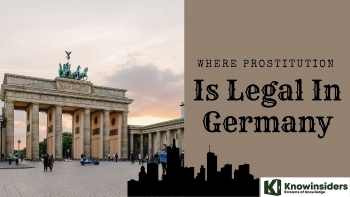 Where Prostitution Is Legal In Germany Where Prostitution Is Legal In Germany Throughout German history, prostitution was never criminalized and was widely accepted into mainstream culture. |
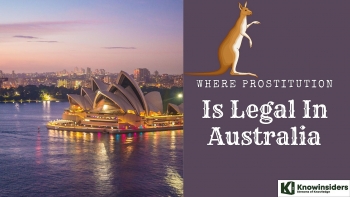 Where The Prostitution Is Legal In Australia? Where The Prostitution Is Legal In Australia? Prostitution in Australia (Sex work in Australia) is governed by state and territory laws, which vary considerably. |
 Where Prostitution Is Legal In Nevada Where Prostitution Is Legal In Nevada Nevada is the only U.S. state where prostitution is legally permitted in some ... |
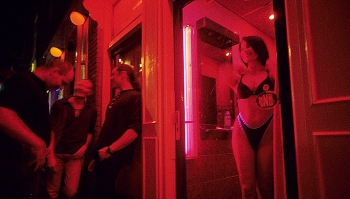 Where Is Prostitution Legal in Europe and Countries Ban on Sex Work Where Is Prostitution Legal in Europe and Countries Ban on Sex Work Which countries is prostitution legal in Europe and What countries observe a strict ban on sex work? |


























